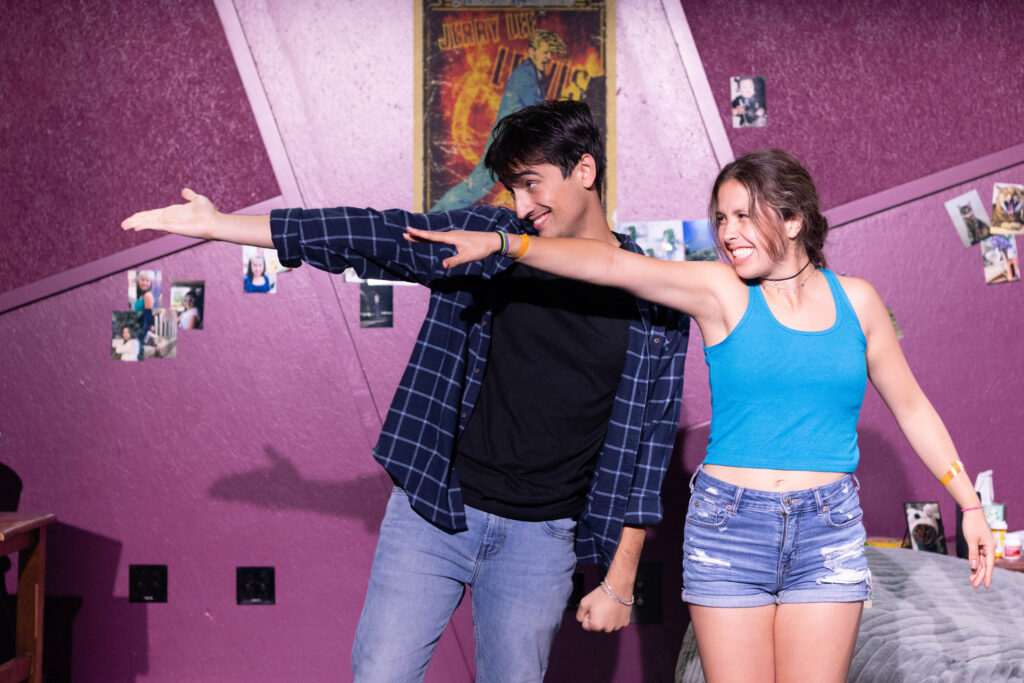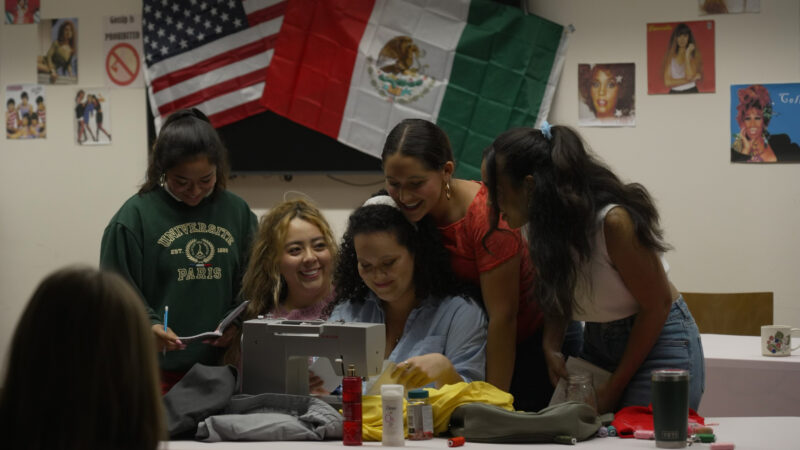Though many people may have their own ideas about what constitutes a “minority,” the executive board of Modern Minority Theatre Company (MMTC)—an independent student group dedicated to providing learning opportunities for students and lifting up underrepresented voices—likes to take a broad approach.
“Minority isn’t just your ethnicity or your social class—although those are definitely types of ‘minority,’” said MMTC president Mitchell Jung (BA Theatre & Public Relations ’27). “There’s also ‘minority’ in the sense of people who want to try theatre but have never been given the space to do so.”
“It’s not necessarily in the sense you would normally think,” agreed MMTC Secretary Maya Nañez (BA Theatre, Emphasis in Acting ’25). “It’s also people who just feel unheard and feel like they haven’t been given a proper amount of space to be an artist.”
This inclusive philosophy of providing safe spaces for everyone and telling underrepresented stories pervades MMTC’s productions. The group has been emphasizing casting a wider net, allowing people who might normally not get involved in theatre—but who have the interest and passion to do so—to gain hands-on experience, an invaluable asset for first-time actors and production crew.
“A lot of the time with ISPs, people want someone with experience, which is fair,” said Nañez. “But how can people get their first chance?”
This inclusive philosophy was on full display in last year’s production of Real Women Have Curves, directed by Nañez. Aside from the stage manager, all of the crew and production teams were performing their roles for the first time ever, learning from their peers and gaining new skills in a safe and welcoming environment.
“It’s providing a safe space where everybody knows it’s okay to make mistakes. You don’t need to worry about being perfect,” said MMTC Production Manager Anne Tilley (BFA Screenwriting ’27). “What’s the worst thing that can happen? You mess up, and you move on.”
In addition to emphasizing peer-to-peer learning and giving opportunities to first-time actors and production members, MMTC takes great care when choosing which stories to tell. It’s a fine line to walk: the group makes a point of selecting underrepresented, cultural stories, but with roles that can be open to a wide array of actors.
“We’ve specifically chosen shows that are more open-casting,” explained Jung.
He pointed to this semester’s production of I And You, performed in the Dick Wolf Drama Center’s new Stop Gap Theatre. It’s a play in which the only specific requirement for actors is that they be of different ethnicities from one another.
“We don’t want people to feel they can’t audition for roles because they aren’t a certain ethnicity, or a certain age,” said Jung. “We try to pick shows that are a bit more open-casting, but that still tell a cultural story.”
MMTC also puts an emphasis on telling modern stories that represent the lived experiences of their members. When choosing what productions to put on each year, MMTC board members look for passionate students who understand the lived experiences of the plays they are proposing to direct.
Nañez explains: “If a director is passionate enough about a project and knows enough about the subject—if they can say, ‘This is something I see in my day-to-day life’—it provides an opportunity to teach others about the world and about our own struggles and experiences.”
“We’re talking about things that people have felt in the modern era,” Jung added. He pointed to the topic of navigating the medical system, which is a subject he has been interested in seeing tackled in theatre. Research shows that minorities often face discrimination and poorer outcomes in the medical system. “That’s an example of a story we’d be interested in telling, because it’s something minorities are experiencing now.”

Passion over experience
When recruiting, MMTC knows what it’s looking for: students who are passionate about theatre and willing to learn. Experience? Not so much of a requirement.
“Knowing that someone is passionate about being there, someone who is going to be excited and positive about doing the work—that’s a huge factor [in choosing actors and crew members],” said Nañez.
They also prioritize people who are willing to learn and who know how to get along with others. Inclusivity being a huge part of their mission, the group aims to create a tight-knit community that makes room for learning, growth and making mistakes.
“There’s something about being nice,” Tilley said. “Just making sure everybody feels safe and that it’s a learning environment. Our community is so tight, and we’re so focused on being a safe space, that negative vibes can’t happen.”
“Being in an ISP is great because you have to be a little vulnerable and trust the people you’re working with to pull through, because they’re also trusting you to pull through,” added Jung. “That voluntary vulnerability to trust yourself and others has really helped me develop as a person and also as someone working in theatre.”
As they wrap up the Fall semester, the board members of MMTC have big plans for the Spring, including producing another play, bringing in a speaker and possibly reviving their “24-Hour Theatre Festival”—an event where students write, direct, and produce adaptations of dramatic arts pieces, ranging from Shakespeare to Disney Channel movies, all within a 24-hour period.
“It’s an opportunity for people to do theatre where they don’t have to make as much of a time commitment,” said Nañez. The group is currently pursuing a grant that would help them bring back the festival, which has been put on by MMTC in years past.
Above all, MMTC encourages students who might not otherwise think of doing theatre to get involved.
“If you’re passionate and you want to try something new, give us a shot,” Jung said. “We’ll help teach you, and you can help us as well.”
